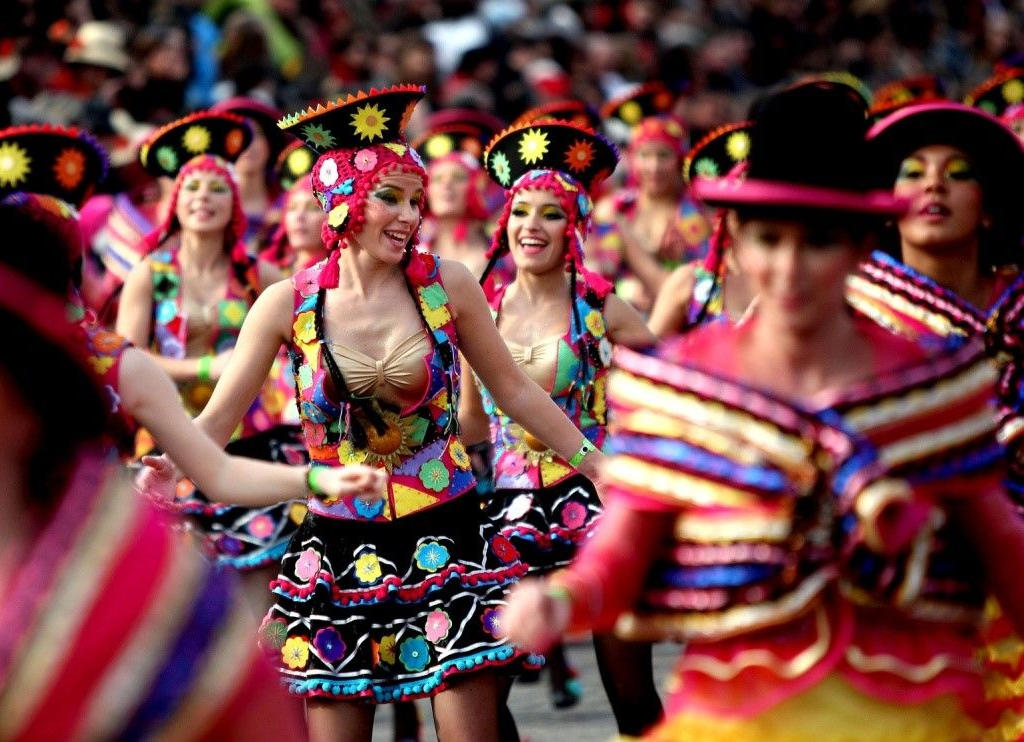1. New Year's Day (Ano Novo):
The year begins with a festive celebration on January 1st, known as New Year's Day. This public holiday is marked by fireworks, parties, and family gatherings. Many Portuguese people participate in the tradition of making New Year's resolutions, reflecting on the past year, and embracing new beginnings.
2. Carnival (Carnaval):
Carnival in Portugal is a vibrant and colorful festival that takes place in February or March, depending on the lunar calendar. It is a time of revelry and merriment before the Christian season of Lent. Festivities include parades, music, dancing, and elaborate costumes. The cities of Lisbon, Ovar, and Torres Vedras are known for their spectacular Carnival celebrations.
3. Good Friday (Sexta-feira Santa) and Easter Sunday (Domingo de Páscoa):
Good Friday and Easter Sunday hold religious significance for the predominantly Catholic population of Portugal. Good Friday commemorates the crucifixion of Jesus Christ, while Easter Sunday celebrates his resurrection. Many Portuguese attend church services and participate in religious processions during these days. Easter is also associated with traditional culinary delights, such as Folar da Páscoa (Easter bread) and Pão-de-ló (sponge cake).
4. Freedom Day (Dia da Liberdade):
April 25th is an important public holiday in Portugal, known as Freedom Day. It commemorates the
1974 Carnation Revolution, a peaceful military coup that ended the authoritarian
Estado Novo regime. On this day, people gather in the streets, wave Portuguese flags, and wear red carnations, symbolizing the peaceful overthrow of the dictatorship.
5. Labour Day (Dia do Trabalhador):
May 1st is recognized as Labour Day in Portugal, honoring workers and their contributions. It is a day dedicated to labor rights and social justice. Trade unions and labor organizations often organize rallies, marches, and cultural events to highlight the importance of workers' rights.
6. Corpus Christi (Corpo de Deus):
Corpus Christi is a religious holiday celebrated on the Thursday following Trinity Sunday, which falls 60 days after Easter Sunday. It commemorates the belief in the body and blood of Jesus Christ present in the Eucharist. In Portugal, this day is marked by religious processions, where the streets are adorned with intricate carpets made from flowers and colored sawdust.
7. Portugal Day (Dia de Portugal, de Camões e das Comunidades Portuguesas):
On June 10th, Portugal celebrates its national day, known as Portugal Day. It honors the country's cultural heritage, as well as the renowned poet
Luís de Camões. Festivities include parades, concerts, traditional music, and dance performances. The main celebrations take place in Lisbon, where the President of the Republic delivers a speech highlighting the nation's achievements.
8. Assumption Day (Assunção de Nossa Senhora):
August 15th is a religious holiday that celebrates the Assumption of the Virgin Mary into heaven. It is an important day for Catholic pilgrims, who visit shrines and attend special Masses. In some coastal areas, such as Nazaré and Cascais, there are processions by fishing communities to bless the sea and pray for protection.
9. Republic Day (Implantação da República):
October 5th marks Republic Day in Portugal, commemorating the end of the Monarchy and the
establishment of the Portuguese Republic in 1910. This public holiday celebrates the principles of democracy and national sovereignty. Parades, historical reenactments, and cultural events take place throughout the country to honor this significant historical milestone.
10. All Saints Day (Dia de Todos-os-Santos):
November 1st is a religious holiday that honors all the saints in heaven. It is a day for Portuguese families to remember their deceased loved ones and visit cemeteries to pay their respects. Many people decorate graves with flowers and candles, creating a solemn yet poignant atmosphere.
11. Restoration of Independence (Restauração da Independência):
December 1st is a public holiday that commemorates the
Restoration of Independence in 1640. It marks the end of the Spanish rule during the Philippine Dynasty and the resurgence of Portuguese independence. The day is celebrated with patriotic events, historical exhibitions, and cultural activities across the country.
12. Immaculate Conception (Imaculada Conceição):
On December 8th, the Immaculate Conception of the Virgin Mary is celebrated. According to Roman Catholic doctrine, this day commemorates the belief that Mary was conceived without original sin. Many churches hold special Masses, and religious processions take place, particularly in cities like Braga and Fátima.
13. Christmas Day (Natal):
Christmas is a joyous and festive occasion celebrated on December 25th throughout Portugal. It is a time for family gatherings, exchanging gifts, and enjoying traditional Portuguese cuisine. Many towns and cities decorate their streets with lights and ornaments, creating a magical atmosphere. Midnight Mass is also an important part of the Christmas celebrations, with churches filled with worshippers.
Conclusion:
Understanding the public holidays of Portugal is essential for travelers who wish to immerse themselves in the rich culture and traditions of the country. These holidays provide an opportunity to witness vibrant festivities, experience religious customs, and connect with the Portuguese people. Whether it's dancing in colorful Carnival parades, witnessing religious processions, or joining in the patriotic celebrations, participating in Portugal's public holidays offers a unique insight into the country's history and cultural heritage. By embracing these special occasions, travelers can create memorable experiences and gain a deeper appreciation for the diverse tapestry of Portugal's traditions.
